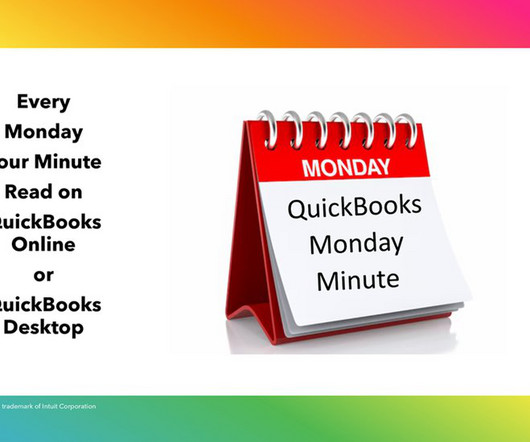Automate Your I-9 Process with QuickBooks Workforce
Insightful Accountant
JULY 7, 2024
Murph takes you through the steps of automating I-9 compliance using QuickBooks Workforce coupled with QuickBooks Premium or Elite.

Insightful Accountant
JULY 7, 2024
Murph takes you through the steps of automating I-9 compliance using QuickBooks Workforce coupled with QuickBooks Premium or Elite.

Accounting Tools
JULY 7, 2024
Many business decisions require a firm knowledge of several cost concepts. Different types of costs have differing characteristics. Consequently, when reviewing a business case to determine which path to take, it is useful to understand the following cost concepts: Fixed, Variable, and Mixed Costs A fixed cost , such as rent, does not change in lock step with the level of activity.
This site is protected by reCAPTCHA and the Google Privacy Policy and Terms of Service apply.

NextProcess
JULY 7, 2024
When you started your new small business, you probably didn’t invest in Procure to Pay software or automation for purchase orders. After all, how hard is it to just call your supplier or place an order online when you need new paper clips? Placing orders without formal purchase orders (POs) and saving receipts can work when your company is small.

Accounting Tools
JULY 7, 2024
The collection of accounts receivable is vital, since it provides the cash needed to support company operations. Collecting accounts receivable is not just the task of the collections department. Instead, it calls for a company-wide effort, because collections can be improved before an invoice is ever issued to customers. Consider the following steps for collecting accounts receivable: Resolve Internal Problems A fair proportion of all customer invoices are not paid because customers are dissati

Speaker: Dave Sackett
Traditional budgeting and forecasting methods can no longer keep pace with today’s rapidly evolving business environment. Static budgets, rigid annual forecasts, and outdated financial models limit an organization’s ability to adapt to market shifts and economic uncertainty. To stay ahead, finance leaders must leverage a future-forward approach—one that leverages real-time data, predictive analytics, and continuous planning to drive smarter financial decisions.

CSI Accounting & Payroll
JULY 7, 2024
When you’re looking to buy a specialized business, it can take a lot of time to get your own licensing, patents, contracts, and customers. Time is money – can you afford to wait?

IMA's Count Me
JULY 7, 2024
Join host Adam Larson as he sits down with data integrity expert and author, Jane Sarah Lat , to uncover essential insights from her book, Managing Data Integrity for Finance. Jane breaks down the critical concepts of data integrity and data quality, using relatable analogies and real-world applications. In this episode, Jane shares the importance of maintaining accurate and reliable data in today's tech-driven finance landscape.
Financial Ops World brings together the best financial operations content from the widest variety of thought leaders.

Accounting Tools
JULY 7, 2024
What is a Bad Debt Provision? A bad debt provision is a reserve against the future recognition of certain accounts receivable as being uncollectible. For example, if a company has issued invoices for a total of $1 million to its customers in a given month, and has a historical experience of 5% bad debts on its billings, it would be justified in creating a bad debt provision for $50,000 (which is 5% of $1 million).

Accounting Tools
JULY 7, 2024
What is Write-Up Work? Write-up work involves the preparation of financial statements for a client without first reviewing or auditing the underlying information. This is a relatively low value-added activity, so the fee charged to the client for this service is generally low. An accountant is most commonly hired for write-up work by clients who do not have any employees who are qualified to produce these reports.

Accounting Tools
JULY 7, 2024
What is Capital Maintenance? The capital maintenance concept states that a profit should not be recognized unless a business has at least maintained the amount of its net assets during an accounting period. Stated differently, this means that profit is essentially the increase in net assets during a period. This concept excludes the following cash inflows and outflows that impact net assets: Increase in assets from the sale of stock to shareholders (increases cash ) Decrease in assets from the p

Accounting Tools
JULY 7, 2024
What is a Wholly Owned Subsidiary? A wholly owned subsidiary is an entity whose stock is entirely owned by another entity. The owning entity is called the parent. A subsidiary may become wholly owned as the result of an acquisition , or because the parent spun off certain assets and liabilities into a separate entity. Larger organizations are more likely to have wholly owned subsidiaries.

Speaker: Erroll Amacker
As businesses increasingly adopt automation, finance leaders must navigate the delicate balance between technology and human expertise. This webinar explores the critical role of human oversight in accounts payable (AP) automation and how a people-centric approach can drive better financial performance. Join us for an insightful discussion on how integrating human expertise into automated workflows enhances decision-making, reduces fraud risks, strengthens vendor relationships, and accelerates R

Accounting Tools
JULY 7, 2024
What is a Wrap Report? A wrap report is a low-cost annual report , which is a public company 's Form 10-K with an annual report cover wrapped around it. A small amount of additional commentary may be added by management. The cost is kept low by avoiding the use of graphics or color, and by minimizing the page count. Larger entities are usually willing to allocate substantially more money to the production of a more lavish annual report.

Accounting Tools
JULY 7, 2024
An accounts payable system pays the bills of a business in an organized manner. The goals of this system are to make payments in a timely manner and to pay the correct amounts to the correct suppliers. The following steps can be used to set up such a system: Select software. Buy an off-the-shelf accounting software package that contains an accounts payable module.

Accounting Tools
JULY 7, 2024
What is a Byproduct? A byproduct is an incidental product that is created by a manufacturing process that creates multiple products. The other products created by the process are considered to be the primary output of the system. It may be possible to sell byproducts; alternatively, any revenues to be gained from byproducts are so minor that they are simply discarded as waste.

Accounting Tools
JULY 7, 2024
What is a Warranty? A warranty is a guarantee related to the performance of non-financial assets that are owned by the party being guaranteed. A guarantee is frequently incurred in connection with the sale of goods or services to the party being guaranteed. If the warranty is related to a product, the party providing the guarantee normally replaces or repairs the product in question.

Advertisement
Based off SkyStem's popular e-Book, the book of secrets to the month-end close will be revealed in this one-hour webinar. Learn leading practices when it comes to building a strong and sustainable month-end close that has room to grow and evolve. Learn about the power of precise estimates, why reconciliations are critical to closing the books, how and when to automate, and how the chart of accounts play into your close process.

Accounting Tools
JULY 7, 2024
What is a Permanent Account? Permanent accounts are those accounts that continue to maintain ongoing balances over time. All accounts that are aggregated into the balance sheet are considered permanent accounts; these are the asset accounts , liability accounts , and equity accounts. In a nonprofit entity, the permanent accounts are the asset, liability, and net asset accounts.
Let's personalize your content